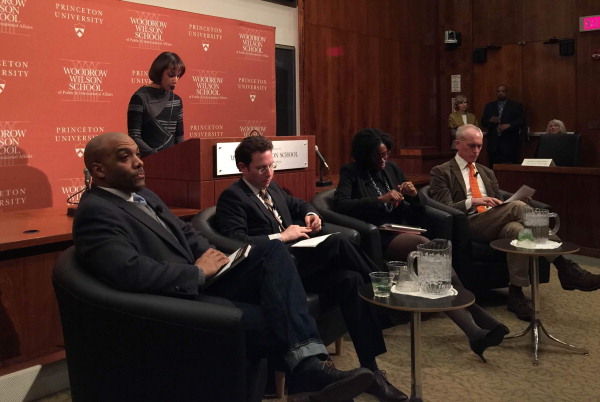By Nathan Phan, Special Writer
PRINCETON – In beginning to talk about Woodrow Wilson and his legacy at Princeton University, Brandeis University professor Chad Williams (’04) made it clear that there was something greater to be discussed beyond Wilson as an individual and beyond his racism toward African Americans.
“It’s one thing to revisit Wilson, to recognize Wilson and his record when it comes to race, but I think it’s something more profound and urgent to reckon with what that means,” said Mr. Williams. “I’m interested in how we reckon with Wilson, but more so how we reckon with the history that Wilson is a part of.”
This thought of grappling with both Mr. Wilson and the role of African Americans in American history served as one of the central discussion topics Mr. Williams and other notable guest speakers discussed in a panel Friday at Princeton University in Dodds Auditorium. The panel was held alongside the art exhibit “In the Nation’s Service? Woodrow Wilson Revisited,” which featured media from newspaper clips to photographs showcasing the different sides of Mr. Wilson’s personal life and career.
Designed to discuss the varying perspectives on Mr. Wilson’s life and his contested legacy on the university, the panel took place days after the announcement that the university’s School of Public Policy and International Affairs would keep Mr. Wilson’s name. Efforts to change the name of the school began last November when students and Black Justice League members protested for 32 hours in Nassau Hall, which ended when they agreed to the development of a committee that would decide on whether or not to remove Mr. Wilson’s name, among other demands.
Pulizter Prize-winning author A. Scott Berg (’71), who served as one of the members of the committee that decided on the keeping Mr. Wilson’s name, described being alarmed at the level of misinformation he found in reading statements and hearing testimonies about Wilson throughout the committee process.
Denying the accusations of Mr. Wilson’s associations to the Ku Klux Klan and being a misogynist or anti-Semitic, Mr. Berg emphasized to the audience the importance in understanding the context of Mr. Wilson’s progression at the time – that despite being a racist toward African Americans, he continued to keep the race conversation going.
“I’m not trying to justify him, but I’m trying to contextualize him; I’m trying to give you a sense of what this country was,” said Mr. Berg. “The world of 1913, especially in a Southern town such as Washington D.C. or even Princeton, New Jersey, was a very different place than it is today.”
University of Richmond Professor Eric Yellin (’07), in describing Mr. Wilson’s legacy, also explained the need to understand the historical context of Mr. Wilson’s time. Mr. Yellin spoke about how Wilson, in hopes of reunifying the American North and South, continued racial practices against African Americans carried on by others.
Mr. Yellin pointed out how during his time as the president of the university, Mr. Wilson justified his opposition to allowing black students into Princeton because of the potential threat of racism in the mostly white and Southern student population. Mr. Wilson would go on later as the president of the United States to impose segregation and prevent African Americans from entering professional civil-service roles. Although accepting that Mr. Wilson may have had the best intentions, Mr. Yellin asserted that in fully assessing Mr. Wilson’s legacy, it meant looking at his impact on America as a whole, including African Americans.
“What historians mean by legacy is what did his presidency mean for Americans?” said Mr. Yellin. “What his presidency meant for African Americans was devastation, was an endorsement of not just segregation but of absolute capping on what their life’s promise was, and then ultimately by 1919, an acceptance of violence and terror and killing. And those are legacies that are – to a historian –critical and really go well beyond his heart.”
By the end of the panel discussion, the conversation shifted from the topic of taking Mr. Wilson’s name off the school to looking at how Mr. Wilson’s legacy serves as an opportunity to discuss and grapple with issues on race today.
Afterwards, panelists and members of the audience were welcomed to the art exhibit in Robertson Hall, where they continued the dialogue in discussing Mr. Wilson’s legacy and its significance today.
“As we have seen throughout the protests that are happening on college campuses, it’s not just about the name,” said Ashleigh Lawrence-Sanders, a history doctoral student at Rutgers University. “It’s about what’s happening to the individual students who have problems with the fact that this name represents some of things that they see wrong with where they are.”
The art exhibit is open Monday through Friday from 9 a.m. – 5 p.m and will run from through Oct. 28. Sponsored by the university, the exhibit was created in the partnership to the Seeley G. Mudd Manuscript Library and the Woodrow Wilson School of Public and International Affairs.

